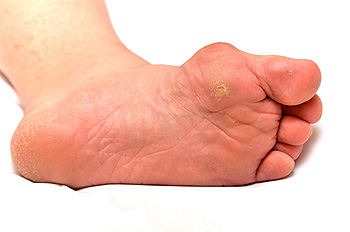 If you see a small bony area at the base and side of the big toe, you may have what is known as a bunion. This is typically a result of a deformed bone structure, and it appears as if the feet are not aligned correctly. There may be several causes for bunions to form, including having low arches, which may lead to instability as walking occurs, medical conditions such as rheumatoid arthritis, or injuries that the foot may have incurred. Recent research has shown that women who frequently wear high heels could cause a pre-existing case of bunions to become worse, and may notice that the toes do not have enough room to move about. The area may feel tender and appear red, possibly accompanied by swelling and a burning sensation. Complications may develop as a result of not seeking medical treatment. Many patients may experience calluses and difficulty in walking when bunions have developed, and it’s suggested to seek the counsel of a podiatrist, who may provide information about the correct treatment options.
If you see a small bony area at the base and side of the big toe, you may have what is known as a bunion. This is typically a result of a deformed bone structure, and it appears as if the feet are not aligned correctly. There may be several causes for bunions to form, including having low arches, which may lead to instability as walking occurs, medical conditions such as rheumatoid arthritis, or injuries that the foot may have incurred. Recent research has shown that women who frequently wear high heels could cause a pre-existing case of bunions to become worse, and may notice that the toes do not have enough room to move about. The area may feel tender and appear red, possibly accompanied by swelling and a burning sensation. Complications may develop as a result of not seeking medical treatment. Many patients may experience calluses and difficulty in walking when bunions have developed, and it’s suggested to seek the counsel of a podiatrist, who may provide information about the correct treatment options.
If you are suffering from bunions, contact Dr. Richard Silverstein of Union Foot Care. Our doctor can provide the care you need to keep you pain-free and on your feet.
What Is a Bunion?
A bunion is formed of swollen tissue or an enlargement of boney growth, usually located at the base joint of the toe that connects to the foot. The swelling occurs due to the bones in the big toe shifting inward, which impacts the other toes of the foot. This causes the area around the base of the big toe to become inflamed and painful.
Why Do Bunions Form?
Genetics – Susceptibility to bunions are often hereditary
Stress on the feet – Poorly fitted and uncomfortable footwear that places stress on feet, such as heels, can worsen existing bunions
How Are Bunions Diagnosed?
Doctors often perform two tests – blood tests and x-rays – when trying to diagnose bunions, especially in the early stages of development. Blood tests help determine if the foot pain is being caused by something else, such as arthritis, while x-rays provide a clear picture of your bone structure to your doctor.
How Are Bunions Treated?
- Refrain from wearing heels or similar shoes that cause discomfort
- Select wider shoes that can provide more comfort and reduce pain
- Anti-inflammatory and pain management drugs
- Orthotics or foot inserts
- Surgery
If you have any questions, please feel free to contact our office located in Havre de Grace, MD . We offer the newest diagnostic and treatment technologies for all your foot care needs.
